Priyanka Nair (Joshi)'s Blog, page 15
November 19, 2021
The Ultimate Joy Of Missing Out: Embracing the moment
A few months back, I wrote a piece on FOMO – Fear Of Missing Out, quite a hot topic to discuss in today’s digital era. Where I see so many mindFULL people struggling to be in the moment and enjoy the little things of life, I decided to embrace the nothingness and the Joy Of Missing Out-JOMO.
We want to be everywhere, do everything, compare our lives with others even without knowing the exact math and science of the other’s life. We fear being missed and miss being in the events and occasions, but sometimes it is just ok to let go of all the fears and embrace the moments.
The past few months have been very taxing, emotionally draining and exhausting for me. Yes, even I have my days. I have bad and worst days too. I went through my final legal separation process and then I began my quest for my second innings.
 Shimla, Himachal Pradesh, India
Shimla, Himachal Pradesh, IndiaBeing a determined and focused person, I have learned to compartmentalize my pain areas in life. I might be grieving but I am also healing, it is a process. Every event, every incident, every recovery has its own process and I have allowed myself to go through it.
So, yes I minimised my work, i.e sponsored posts, blog hop participation, poetry writing, Youtube videos and even Podcasting. I focused on WHAT NEXT and in that process, I went to Sri Lanka to meet my parents.
Now, Sri Lanka is truly a god’s own country, it has got some vibes, peace vibes? I don’t know what to call it, but I was at peace amid nature’s beauty, greenery, coconut trees, fresh air and Buddha statues at every corner, plus being with family added to the bliss.
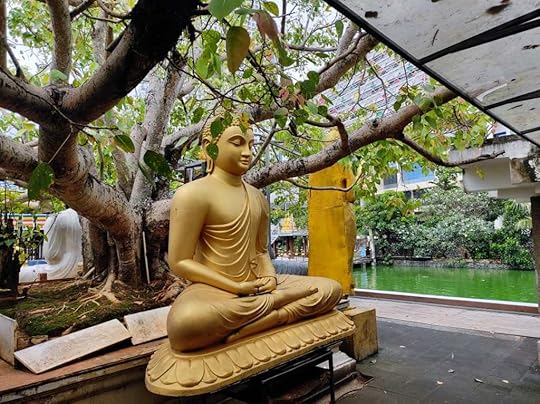 Seema Malakaya,Colombo,Sri Lanka
Seema Malakaya,Colombo,Sri LankaI didn’t fear missing out on this, and I was embracing the joy of missing out. I did not activate the international roaming service on my cell phone, I was just using WhatsApp for important communications and I was working only through emails. It worked, for one whole month I hardly used my cell phone, hardly spoke to people and yes I was at much peace.
So what is this Joy of missing out? What all I missed?I missed wishing birthdays to my friends, even my best friend
I missed conducting a few sessions, filtered out the most relevant and needed one
I missed writing for #NaNoWriMo2021 which I had signed up happily thinking to complete the book I started 6 months back. Maybe it needs a little more time.
I missed writing blogs on Sanity Daily, Virtual Siyahi
I missed keyword researching, understanding what my readers want to read
I missed being accessible to everyone who doesn’t spark any joy in my life
I missed creating digital content for which no one is waiting
But I did not miss being in the moment, I completely enjoyed my time with my family, structured my day and prioritised my work. I accepted only emergency calls, sessions and paid assignments.
 Somewhere in ColomboWhy you should embrace the joy of missing out?
Somewhere in ColomboWhy you should embrace the joy of missing out?I embraced the joy of missing out because it helped me to gain better clarity and look at the things that mattered the most at that point in time. The joy of missing out phenomena did not only helped me to stay mindful but also helped me to declutter my thoughts, my visions and future course.
The past month also helped to adopt a few life-altering daily habits.
I have cut down on the coffee intake
I eat a lot of salad and fruits
My day begins with Music
I sleep early and get up earliest possible
I finish all the cooking for the day in one go
I spend more time with my child
I spend time and money on plants and books
I try to be grateful for all the things I have and I am capable of doing
When I came back to my home, I checked my email, replied to each of them, scheduled for a few zoom calls. Lined up sessions and webinars. Decided to write down this blog.
 My reading and writing nook
My reading and writing nookI even revamped my room and gave it a new feel, more of a blogger’s altar 🙂
In short, I didn’t miss anything. Everything is in place. I picked up from where I left. For all those, who fear missing out on things, pause and reflect, what is that you’re going to miss? Is it relevant? Does it define your very basis? Does it help you earn? Does it spark any joy in your life? Does it add any value? Those who want to reach you will reach you anyway, things that are meant for you will wait for you.
Try segregating your fears and you will get to the crux of your anxiousness and it will surely help you to prioritise things/tasks and help you embrace the joy of missing out.
Shine on!
Love and light
……………………………………………………………………………

Priyanka is a published author of 26 Days 26 Ways for a Happier you, Ardhaviram and Broken & Beautiful. An NLP practitioner and Founder of Sanity Daily, helping you prioritize your mental health. Let’s build a happy community.
November 2, 2021
3 Ways To Advance Your Fitness Level With Online Fitness Classes
If self-love is my new super-power, investing in self is my new life mantra. Whether it is upgrading a skill or joining online fitness classes, I am all game for it. Surging covid waves and increasing bellies have ironically put people into the dark pit of self-doubt and lower self-esteem due to various reasons.
While a pandemic like COVID-19 is beyond our control, we can surely work on the things within our control. We can work on ourselves, and make healthy choices in our daily life. We can define a few life-changing habits to stay fit and preserve our sanity.
Pre-pandemic, no one ever imagined life on the internet. Online classes, online fitness programs, online jobs, as if the whole world came rolling in our palms. Today, we have the ease of accessing all the resources according to our time and preference, all we have to do is search for the best available options.
5 Reasons to Sign-up For Online Fitness ClassesIt took a while for me to make up my mind for signing up for an online fitness program, but once I opted for it, there was no looking back. If you are someone who is still wondering about it, then here are a few reasons for you to pump up your thinking muscles ad show some self-love:
1.) Online fitness classes work best for moms who cannot go out and attend gym or fitness sessions. But simultaneously, crave a fitter and active body.
2.) They are customizable and affordable. You can decide time, frequency and subscription plan based on your convenience.
3.) You can avoid the fear of contamination while perfectly managing the social distancing.
4.) You can opt for an online class as per your desired timeline.
5.) You can track your progress with high-tech apps and under expert guidance.
 3 Ways to Advance Your Fitness Level With Online Fitness Classes
3 Ways to Advance Your Fitness Level With Online Fitness ClassesThe recent scenario has changed our approach and opinion towards online classes. Primarily to avoid crowded places, more and more people are opting for online fitness classes, yoga classes and even wellness retreats.
Nothing beats the rush of working out and it is very important that you squeeze out some time for yourselves from your daily schedule. These online fitness regimes offer a variety of workouts, healthy diet recipes, healthy lifestyle choices under expert guidance with affordable/customised subscriptions. And, here are a few ways to get you started for your online fitness classes:
1.) Identifying best options
I agree we prefer a personal touch when it comes to any kind of classes, we can also watch videos and do things, but what we lack here are motivation and push. Despite these reasons, online fitness programs have gained a prominent boom in recent times.
All you need is to understand your body requirement. Identify the best online fitness classes as per your time and affordability to sweat out those toxins inside you.
2.) Goal-setting
While you opt for a fitness program, losing the bodyweight should not be your sole focus, you should also focus on many other things like psychological benefits, self-care and building resiliency.
There are proven psychological benefits of exercising daily. Exercise can have a positive impact on your mental health and self-esteem. It can also enhance mood and reduce stress levels, thus allowing us to tackle daily challenges in a more positive, optimistic and constructive way. So set your fitness goals wisely.
3.) Self-discipline
This is actually the first step when it comes to following a practice. Be it anything out of exercise, yoga, meditation or any kind of physical activity you pick for yourself, it requires a lot of dedication and discipline from your end. Hence, begin with, preparing your mind to prepare your body. This way you will be able to stay regular and consistent with whatever choices you make.
To conclude, I would say, with changing times and a fast-paced lifestyle, we must invest a little in our health and overall well-being. Our physical health and mental health are directly related to each other and we can never ignore either of aspects. We can improve our quality of life by adopting a few physical activities in our daily life. Say yes to life, and be better every day by making healthy choices for your body.
October 28, 2021
How to Compartmentalise Your Pain Areas in Life?
My Life sucks! A general notion/expression when everything seems to be falling apart, out of our hands. When we see ourselves surrounded by the darkness and close our eyes as we lose the strength to look ahead.
How to compartmentalise your pain areas in life? How to separate the pain, trauma, people and emotions from your life and focus on what remains in your hands. I have been hovering over these thoughts over the past few days before I sat to pen down this post.
It started, when I saw a man with a fractured hand and he was reading a book, totally engrossed in it. He was calm, still and unconcerned. It got me into thinking, why do we curse our entire life when a part of our life goes wrong?
Just like, if a part of our body is fractured, we won’t say, our whole body is fractured. We will focus on the treatment of that particular injured part, take all the necessary steps to heal and overcome the suffering. Take adequate rest and bounce back to normalcy.
Why can’t we apply the same principle in our daily life? Sounds complicated? How about compartmentalising the pain areas of our lives in small boxes and segregating them? Still not clear?
Ok, for example, my relationship failed, it is ok for me to go through sadness, loneliness, emptiness and even have an impact on my mental health, but does it mean my whole life is gone? Over, just like that? Maybe, I am facing a severe financial crunch and a lot depends on my earning but does it mean my life is a total waste and unworthy?
I am not asking you to dismiss your feelings and what you’re going through, but I am exactly requesting you to own and acknowledge each and every emotion, hold them and put them each in a separate box.
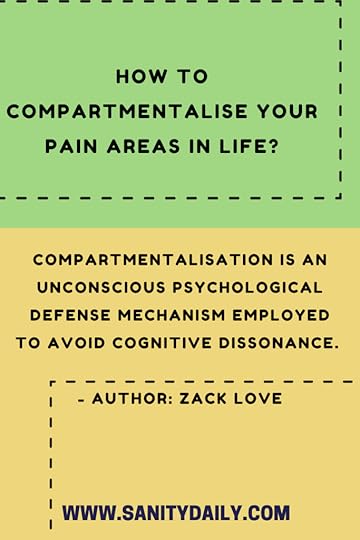
I believe till the day we are alive, we have chances, choices and greater decisions to make in our lives, for our life. Every day 24 hours gets deposited in our bank to make a new choice, I know sounds cliche, read a lot, heard a lot..doesn’t sound practical enough? Try these 3 ways to compartmentalise your pain areas in life:
3 Ways to Compartmentalise Your Pain Areas in LifeCompartmentalisation is a psychological defence mechanism in which thoughts and feelings that seem to conflict are kept separated or isolated from each other in the mind. It may be a form of mild dissociation. Practising dissociation is one of the life-changing exercises I learned in my NLP course which simply propounds having a mild emotional distance or detachment from your immediate surroundings.
It might appear as an alien word and something hard to practise, but I ain’t preaching before trying it 🙂 Over the period of the past few months, I have developed a mental map of small boxes in my mind. Each box denotes major elements of my life. My relationship, my career, my family, my future, my writing passion, my fears and my dreams.
This segregation helps me to gain clarity and focus on each element based on their relevance, yes you can program your mind, it is when you pick up the right box at the right time and place the most disturbing one in the last place.
Here are three ways you can compartmentalise your pain areas in life wit daily practise:
1.) Draw boxes physically on a paper
Yes, you read it right, draw small size boxes and label them ” relationship” or “ex” or “heartache” or “future” or any emotion, fear, grief and disappointment. Remember it is your personal belonging, your small box, it can be anything, so don’t judge, just do it.
Do you know why you should do this? This simple exercise will help you to develop a co-existing space for your inner conflicts and you. The closures we talk about, the acknowledgements and validation we seek, for our thoughts and emotions, here is the first place, to begin with, through self.
2.) Isolate each conflict
Once you are done making these small boxes on your paper, segregate them, rather sub-divide them, go deeper. Suppose if you are uncertain about your future, make a big box of future and what is that worries you the most should be a little smaller box and then label it with your exact worry.
How to compartmentalise your pain areas in life? This way you isolate all your problems that have been overlapping with each other and give them a proper acknowledgement, enough to calm down your anxious mind. Just like a step by step stress reduction process.
3.) Focus on the things in your control
Once you’re done segregating, labelling, by taking the first few steps to compartmentalise your pain areas in life, sit and focus on the things which are still in your hands. An option you can still work on, I know this will not happen all of a sudden, but at least you will be able to be in a position to think clearly.
All these heavy emotions, trauma and painful events sometimes create a fog inside our head and impair our vision, we lose all the focus and energy to look at things from a different perspective.
To conclude, I would say that inner conflicts are part of our life, losing and winning some battles are again part of life, success and failures are also a part of our life, but not our entire LIFE. When a part of your life stops working, you either stop wasting your precious energy into it or nurture it, enhance it to make it workable.
You can only develop this clarity when you learn to compartmentalise your pain areas in life and take complete command of yourself. It is ok not to be ok, but not ok to lose control of your life.
Love and light
……………………………………………………………………………

Priyanka is a published author of 26 Days 26 Ways for a Happier you, Ardhaviram and Broken & Beautiful. An NLP practitioner and Founder of Sanity Daily, helping you prioritize your mental health. Let’s build a happy community.
October 19, 2021
5 Dreadful Mental Health Challenges Faced By Single Moms
Are you struggling with the very less talked about mental health challenges faced by single moms? I know you never planned this or imagined being a single mom in your worst of dreams, but now you are a single mom. Blame your luck, your ex or everything that went wrong in the whole process, it is what it is, now what? It is draining, I agree, rather it is awful and there is an end number of mental health challenges faced by single moms as an after-effect.
If it takes a village to raise a child, just imagine how much mental and emotional strength it takes to raise a child alone, unassisted and single-handedly? Forget about the physical and financial capacity. A separation/divorce causes a ripple effect and you are never fully prepared to anticipate what might come next, all this leads to a lot of stress and mental health deterioration. In this blog, I am going to talk about a few mental health challenges faced by single moms.
5 Dreadful Mental Health Challenges Faced By Single MomsAs a typical single mom, you will suddenly feel lonely and trapped in your own mind, no matter how many times you visualised being alone and separated, but reality hits differently. From being judged to being misinterpreted, for being restless for all the uncertainty hounding you, you also go through a lot of mental turbulence.

Parenting alone is physically and emotionally demanding, and if you are a single mom, it can surely take a toll on your mental health. Here are a few dreadful mental health challenges faced by single moms across the globe:
1.) Financial insecurity and future uncertainty
Suddenly, the feeling of financial insecurity starts entailing and haunting you. You feel all the more responsible towards your child’s future needs for their overall development and quality of life. The rising tuition fee, extra-curricular activities, medical emergencies, own house, a decent living all these visuals make one restless and desperate at the same time.
Then there is a lot of future uncertainty involved when you are newly separated and restarting your career path. The job, the place, new arrangement, new pain and its after-effects, honestly speaking, it lasts longer than one can imagine.
2.) Dealing with past memories
While you are stuck in moving on and grieving for the big loss of your life at the same time, you go through an extreme emotional ride. It is not the person you miss, but the memories attached with each event, each festival and belongings make it a little tough to deal with, for a while.
This process is one of the draining mental health challenges faced by single moms.
3.) Unsupportive atmosphere
You know, one day a lady living next door advised me to become a little cautious and street smart, just because I am a single mother. I wonder how people judge you and give their unsolicited remarks/advice based on a very limited understanding of the subject matter.
An unsupportive atmosphere could involve family members, friends, relatives, boss and various other external factors. Dealing with the tag of broken family, a total misfit woman etc. To top it, even the Facebook memories also play their part by continuously popping up old memories with the very person you want to forget those memories.
4.) Lack of self-care
All the episodes of frequent anger, frustration and restlessness lead to major stress and sometimes it is very easy to fall into the depression zone, with not a single ray of hope. There comes the role of community.
But most of the items, women don’t get the much-needed care and affection during this period. Plus she herself stops looking after her, lose the inner-spark and all the energy just because of that one relationship. It is natural but we need to overcome this.
5.) Facing the stigma
There is a lot of stigma and discrimination attached to separation, divorce in India or may in other countries as well. Like, I mentioned above, people easily judge you thinking that divorce might be an outcome of your inability to manage things, manage your husband etc.
If you move on quickly then you are labelled, if you fall into depression or sadness then you are treated as a burden, more or less, life changes but it is up to us how we change our story from here on.
To conclude, I would say, this is indeed one of the toughest road to walk, knowing you are all alone, but that freedom of owning yourself and your life, can be liberating. This is where you can change your narrative, change the end of your story, put a semi-colon instead of a full-stop and hold your child’s hand to move ahead in life, to accomplish greater things.
Before these stressors lead to a major mental health crisis, seek help and be open to receiving help. If you are able to maintain your inner balance in these tough times, you will surely overcome this and will be able to manage your life with grace and vigour. If you are facing difficulties then please seek professional help
You can also reach out to various helplines, you can talk to me or join my Facebook Page- “I Listen- Support Group” and don’t forget to love yourself in this whole process, you need you in all ways and always.
Love and light
……………………………………………………………………………

Priyanka is a published author of 26 Days 26 Ways for a Happier you, Ardhaviram and Broken & Beautiful. An NLP practitioner and Founder of Sanity Daily, helping you prioritize your mental health. Let’s build a happy community.
October 18, 2021
The Effects of Parental Stress on Child Development
Wondering about the effects of parental stress on child development? Life is always dotted with big and small stressful situations. After all, all of us live in a fast-paced society that profits off of individuals facing problems. The main four stressors that each of us faces are money, family, health, and work. While not all of those triggers are in our homes, it’s inevitable that after a long day at work, we’re going to carry our stress and bad mood into our space.
If you think your children are too young to understand what’s going on, you’re right. They can’t grasp what getting fired means, but they can sense a significant shift in your mood as well as the whole home atmosphere.
Let’s explore what adverse effects stress can have on children and how to destress in a way that would be beneficial for you and your child.
Effects of Parental Stress on Child Development at the Earliest Stages of LifeEven though pregnancy can be stressful, it is recommended to avoid distress as much as possible. Studies have shown that stress during pregnancy has a significant impact on child development. Stressful mothers are more likely to give birth to children with ADHD issues and autism.
Moreover, if the parents are stressed during the early years of their child’s life, it affects their kid’s genes. According to a study done in 2011, such situations can affect insulin production needed for brain development. This underdevelopment footprint carries over into the child’s adolescence. It seems that parents’ stress does get under the childers’ skin quite literally.
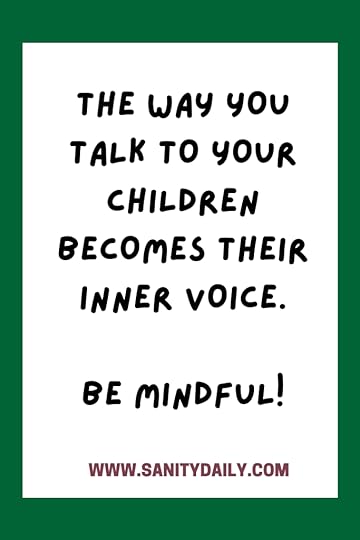 How to Save Your Kid From Being Stressed
How to Save Your Kid From Being StressedChildren mirror everything that their parents do; that’s no secret. So there’s no surprise that the stress and irritation a parent feels is quickly passed on to their child. Of course, if the home situation is the primary stressor, the child will get stressed no matter what.
As the effects of parental stress on child development, it is seen stress in children can reveal itself as physical symptoms such as body aches or wetting the bed. You can also notice mood swings and unexplainable intense irritation.
What do most parents do in such situations? They, consciously or not, become a true helicopter parent, trying to appease every little need. That is not quite what your child needs in a stressful situation, and we can turn to evolution for a better explanation.
In an instinct context, stress is the primary signal that the current situation is unsafe and a predator is near. If there’s no real danger, everyone calms down and gets back to their normal activities.
So, the key to success in stressful situations is creating a calm home environment. Children can only thrive in peaceful and safe spaces. They can’t always understand if the environment is safe, so they turn to their parents for explanation and behavioral cues. If a parent is stressed or uneasy, it signals to the child that danger is near.
While we don’t have actual predators roaming around our houses, a high stress level shows otherwise and causes the child to panic.
The Secret to Creating a Stress-Free Environment
Minmizing the effects of parental stress on child development and creating a stress-free environment when you’re stressed sounds like an impossible task. After a long hard day, all you want to do is sit down at the TV and relax, right? I hate to break it to you, but it’s not healthy for you or your child.
The easiest way of dealing with stress has to be that mindless slipping into bad habits. Whether it be junk food, TV, or any other unhealthy addiction – none of them help you unwind. They only help you avoid your problems that will pop back up with force later.
A change in attitude and reaction to stress needs to be changed here. If you cope with stress by mindless avoidance, your child’s automatic response to stressful situations will be the same.
Instead, let’s look at alternative ways of keeping a calm environment at home.
5 Mindful Ways to Minimize the Effects of Parental Stress on Child DevelopmentHow to minimize the effects of parental stress on child development? Here are a few ways to begin. Changing habits can be a bit stressful in itself but so worth it in the long run. Let’s see what healthy practices you could implement in your household:
Reach out for support: whether it be your partner, co-parent, friend, or a mental health professional, talking it out is essential. You don’t want to bottle everything up just for your frustration to pour out in front of your kid. Connect with other parents: trust me, there’s not a single person who hasn’t been through stressful times, and parents are no exception. Of course, you’re feeling frustrated – you have your struggles to juggle and look after a tiny person too! People who don’t have children might not understand what you’re going through entirely, so you should talk to other peers. Trust me; we’re all in the same boat.Seek opportunities to have fun: it’s a great idea to exchange your usual ways of relaxation for something that doesn’t involve sitting down and wallowing in your situation even more. Do you and your kid have a shared hobby? Maybe you’re both big into soccer, or maybe your child loves building forts. They can’t wait to make one with you!Exercise: does this piece of advice surprise, anyone? Of course not. Training is being shoved down everybody’s throats because it’s that effective. It gets you focusing on something other than your stressor and stimulates your body to make more endorphins, the so-called happy chemicals. If you’d like to add meditation to the mix, yoga is an excellent choice for you and your child. Yoga for kids does wonders when it comes to developing mindfulness at an early age. Relaxing habits: remember those bad habits we discussed earlier? If you’re still drawn to plopping down on a couch after a long day, try exchanging TV for an exciting book. Have a go at journaling – you’ll notice that pouring out all your stress on paper makes you lighter.To conclude, I would say that everyone’s stressed about something every single day. However, each of us is responsible for learning how to unwind and not worry our families out, especially the little ones. In order to lessen down the effects of parental stress on child development, when you change the way you deal with stress, you’ll start seeing results not only in your wellbeing but those around you too.
October 6, 2021
Here Are A Few Life Lessons Worth Keeping Post-Pandemic
Life is full of many transitions. True enough, we made countless shifts here and there brought about by the COVID-19 pandemic, and as the vaccines are being rolled out in pursuit of a virus-free environment, what have been some of the most valuable lessons we learned throughout the course of the global health crisis that we should keep?
In this post, I am talking going to talk about a few life lessons worth keeping post-pandemic. So, here are 6 straightforward life lessons that should still be in your bag even after the virus ceasefires:
6 Life Lessons Worth Keeping Post-PandemicCOVID-19 has taught us many things, many of us have seen the worse. But it was humanity that went for a complete loss besides the global economy. I hope these lessons echo your thoughts.
 Photo by
ready made
from
Pexels
Photo by
ready made
from
Pexels
1.) Happiness is a mindset
In the gruelling times of the pandemic, most of us had a hard time finding happiness in the conduct of our transformed lives especially when happiness meant living the best version of ourselves in the outside world. It is twice as hard when we had set a price tag for it like a new designer bag, a countryside trip with friends, or a party we waited nights for. The truth is that happiness is a mindset. It comes from within ourselves and not from external and superficial things and circumstances.
Quarantining at home may be far from our ideal living conditions and keeps us off our extensive list of wants but through time we learned the discipline to make the most out of what we have and willingly defer the things that can patiently wait. If we can keep ourselves grounded with this attitude even after the pandemic, we can embrace life with a newer perspective and mentally condition ourselves to be happy under all outward and underlying circumstances. And, this is one of the basic life lessons worth keeping post-pandemic.
2.) Absence makes the heart grow fonder
It was certainly heartbreaking having to keep a distance from our friends and family in light of the risks of contagion — most importantly when your predominant languages of love involve physical touch and acts of service. Post-pandemic, we already learned how to interplay not only these but all the other love languages: giving or receiving gifts, quality time, and words of affirmation to optimize our expression of affection. We, then, can already make up for our loved ones for the time we both missed and passed so to rebuild shared memories together again.
3.) The greatest challenge is time
Through social media, we realized how quick life events can turn out to be. Family members grieving over loved ones who passed due to untriumphant COVID-19 battles. We learned how life can be taken away from us in a blink of an eye. Post-pandemic, we all should value time for others equally as our time for ourselves. Do everything while you may, while you can, and while you have the gift of time.
4.) Recognition is a form of gratitude
Essential workers who brave the risks to themselves just to serve have proven to be the current heroes of today’s times. The public manifested their appreciation by making signboards, participating in hashtags on social media, and even paying it forward by helping others in the form of soup kitchens or free meals. Others gave generous tips and extended many thank yous. It would be best to keep this trait alive even after the pandemic.
Also, it is not only those at the frontlines who we should recognize but also everyone who tries strives, and continues even if the times are tough and challenging. Recognitions increase personal morale, self-esteem, and motivation. Those things are what can push others, as well as ourselves, to their core, to do more, and go beyond. If we can light others’ paths in this way, we are forging a world where nothing is impossible.
5.) We can live with lesser stuff
Many of us found a love for decluttering. Time spent quarantining became worthwhile from putting away and donating things that might be more valuable and useful for others. It was one of the best life lessons worth keeping post-pandemic that we have learned to scale down purchases and store fewer things inside our homes.
Living with the minimalist principles gave us more freedom and this lifestyle is definitely worth keeping post-pandemic. Not only does this free up house space but also time, money, and resources. Living with less stuff still makes one feel complete and allows us to focus more on those that matter most — self-love and our relationships.
6.) Health is a true priority
Transitioning to post-pandemic life, we should also retain our self-care healthy habits. Shared social media posts inspired many to shift into a healthier lifestyle and transform their homes into their personal gyms. Online workouts, virtual meditations, and other remote physical activities to entertain oneself did not have a hard time penetrating the new normal life scheme.
One of the most important life lessons worth keeping post-pandemic, health is wealth. Value of health has been given emphasis during the pandemic since it was also campaigned by multiple health offices. Consequently, people followed through by submitting themselves to social distancing rules, hand hygiene practices, and maintaining a healthy lifestyle. Such practices led to giving oneself the needed peace of mind in these trying times of uncertainty.
________________________________________
About the Author:
Bash Sarmiento is a writer and an educator from Manila. He writes laconic pieces in the education, lifestyle and health realms. His academic background and extensive experience in teaching, textbook evaluation, business management and travelling are translated in his works.
October 2, 2021
7 Ways To Stay Self-Motivated When Nothing Seems To Be Working For You
Have you ever felt stuck in a loop of self-doubt and disappointments? Most of the time it is not what others are expecting from us, it is the gap between what we want to fulfil and our inability to reach any near to it? What lacks here? The push? Motivation factor, goal setting or maybe some inspiration?
In this blog, I am going to talk about a few ways to stay self-motivated. Why self-motivated? Because for how long we will wait for someone else to come and brighten our life, it is our life and our first responsibility to make things work for us, the least we could do.
 7 Ways To Stay Self-Motivated by Setting up Some Goals
7 Ways To Stay Self-Motivated by Setting up Some GoalsWe usually seek motivation from outside. We see motivational videos, follow spiritual gurus, mentors, which is a good thing to do but what happens when you are done watching the video? Or done reading a post, a best-selling motivational book? Do you really follow what you hear? Do you try to bring things to practise?
Because eventually no mentor or guide can help you unless and until you decide to help yourself. I stress on decide here because we make decisions every day and most of the time we put ourselves at the end of our priority list and till the time we reach the end of that list, we are already exhausted and out of energy to do anything, am I making any sense here?
If yes, then here are seven ways to stay self-motivated and take complete charge of your life. I am sharing these ways based on my trials and practices, a few things might work for you as well, there is no harm trying 🙂
1.) Be honest with yourself
One of the most important ways to stay self-motivated is to stay honest with yourself. We all know that we have all the answers hidden deep down inside us, it is just that we have built so many layers and layers above our own truth that we fail to understand what exactly are we seeking?
Try to understand that first. Once we accept and own our truth we work on it and when we work on it, we attach a purpose to it, which helps us to stay motivated enough.
2.) Define goals
Define short and realistic goals please, no need to pressurise yourself just because someone around you has achieved a lot more than you. No need to compare your lives with the lives displayed on social media feeds.
Understand yourself, and define goals as per your ability and capacity to fulfil them.
3.) Set up a vision board
One of the effective ways to stay self-motivated is to set up a vision board. It helps you to visualise your future, the outcome of your goals. Try setting up a vision board for real, and outline each and every step you will follow in order to achieve your goals in detail.
4.) Dreams oriented or goals oriented?
It is very important to understand whether you are dream oriented or goal-oriented. It might sound similar but there is a slight difference that is powerful enough. Goals help you to achieve greater heights.
5.) Declutter your thoughts
Your thoughts have the power to create your reality. Be very mindful of your thoughts and thinking patterns. The more synchronized your thoughts are the more sorted you feel as a person when you are completely aligned with what you want and how to achieve it.
6.) Compartmentalise your goals
As an individual, we have many goals and sometimes we mix our personal and professional goals. We might have relationship goals, career goals, personal goals but they cannot have the same path, the same process and the same mindset to follow.
To achieve each goal in the desired manner, we must compartmentalize it.
7.) Take one goal at a time
One of the best ways to stay self-motivated is to take one goal at a time and reduce the stress you take to strive. Once we are able to segregate our goals and compartmentalise them, then it becomes easy to address them based on their priority.
Why am I talking about goals?
A life without a goal is like a ship without a compass. It will take us anywhere if we don’t take control of it. Once we lose control, we lose the motivation to move ahead in the lost space. There could be many ways to stay self-motivated but when it comes to taking complete control of life, we must understand what is holding us back, once we understand our goals and define a vision board, we add a purpose to our life and this very purpose helps us to stay motivated. I hope you find this helpful.
Love and light
……………………………………………………………………………

Priyanka is a published author of 26 Days 26 Ways for a Happier you, Ardhaviram and Broken & Beautiful. An NLP practitioner and Founder of Sanity Daily, helping you prioritize your mental health. Let’s build a happy community.
September 30, 2021
A Writer’s Mental Health From A Writer’s Desk!
There’s a myth out there that emotional suffering is the key to a writer’s creativity and detrimental to a writer’s mental health. When we imagine a poet or a writer, we imagine them sitting in a dark quiet room with tea/coffee/alcohol and in a deep state of thinking, away from the world.
Most of the general population believe you write only when you have suffered a heartache or if something bad has happened to you. Well, I am surrounded by the whole writing community and as far as I can see and recollect, there is a mix of both, although I don’t know all of them personally, some have no brutal past and yet they write beautifully. Some are even hard-core professionals.
Research says, there is a connection between mental illness and creativity. Writing is one of the top 10 professions in which people are most likely to suffer from depression, with men particularly at risk from the illness, according to the U.S. website. But a writer’s creativity is not always an outcome of the writer’s mental health status, but people are also gifted, talented and highly creative.
I admire all the authors who weave fictional stories, write 50,000-word novels, not because they are suffering but they are creative, they have a special thing with their language and vocabulary. Rather, it is otherwise, they don’t get the recognition they deserve, or it is when they completely isolate themselves as writing is a lonely job, sometimes people fail to understand their views and writings. All this and a lot more add to a writer’s mental health deterioration.
 Do You Know What Hampers a Writer’s Mental Health?
Do You Know What Hampers a Writer’s Mental Health?We the writers face occasional writer’s block due to the low remuneration we get, off-beat career choice, lack of supportive environment, isolated/lonely job, sociological factors, less recognition we get and more exploitation we face. That fear of missing out, losing out the essence of reading and writing hampers a writer’s mental health, so it is not how you see a writer in kurta and jhola, it is when you don’t appreciate their creativity, puts them in a tough spot.
If at all, anything that hampers a writer’s mental health is the low remuneration and content exploitation in the name of work. Clients/companies literally exploit writers and pay peanuts for the amount of work they put in creating a piece. Plus, if you are a blogger/digital creator people will come to your blog and would want to collaborate but most of them would offer a barter deal, and delayed payments…sigh!
Then the pressure of creating unique and original pieces every time, writing that another book, promoting it, dealing with gallons of self-doubt, dealing with grammar nazis, then those trolls on social media. Taking Social Media breaks to preserve sanity and all the other things we writers do in order to churn out the best of content out of our wrecked minds.
Aids to improve a writer’s mental healthWriting itself can have a significant impact on your mental health, it acts as a therapy for many. It is high time we start seeing blogging/content creating as a career option. When you ask GOOGLE about, “How to cook pasta” to “Best self-care tips”, it is some content writer/blogger writing the best-optimised article or blog post, to give you the best result on the first rank and first page of Google.
It may look like a thing of time pass to many but writing requires a lot of mental strength and out of the box thinking, plus courage to express your feelings. So, what can help to improve a writer’s mental health?
3 practical ways to improve a writer’s mental health1.) Set realistic goals
Do achievable things, set goals based on your capacities and abilities and not on the basis of what others are doing. Prepare a content calendar, outline topics, put up monthly tasks, divide them into small portions, deal with one task at a time.
2.) Write like no one is reading
Like it is said, dance like no one is watching, I say, write like no one is reading. It could sound ironic, but it helps to write without judging our own writing skills.
3.) Be yourself
Do not fall for the race, the over-hype, competition. Be your own kind of writer or content creator, just be consistent with your thing.
To conclude, I would say that when writers write, they pour out a piece of themselves in every piece they publish, overcoming and fighting all the self-doubts, fears and nervousness. If you cannot appreciate and value the art, leave it to the creator.
Love and light
……………………………………………………………………………

Priyanka is a published author of 26 Days 26 Ways for a Happier you, Ardhaviram and Broken & Beautiful. An NLP practitioner and Founder of Sanity Daily, helping you prioritize your mental health. Let’s build a happy community.
September 21, 2021
8 Practical Ways For Transitioning To Post-Pandemic Life
The COVID-19 haphazardly introduced us to a new way of living and obliged us to form new habits so that we could carry on. For more than a year, many struggled to live amidst the health crisis.
As we now transition to post-pandemic life, one may find it even more challenging to deal with yet another phase of life, especially since many already found a sense of normalcy and have loosened up in dealing with the disruptions brought about by the global outbreak.
Businesses were forced to shut close, social activities were discouraged, and travel plans were deferred. Schools and traditional workplaces were compelled to switch to the digital world. It was a sight not to be seen. Everyone was not prepared for such abrupt changes, but we all had to move forward.
 Photo by
Hassan OUAJBIR
from
Pexels
8 Ways For Transitioning To Post-Pandemic Life
Photo by
Hassan OUAJBIR
from
Pexels
8 Ways For Transitioning To Post-Pandemic LifeBut what exactly do you have to change upon transitioning to post-pandemic life? Here are ways that can facilitate your post-pandemic adjustment without a hitch:
Check which habits to keep post-pandemic.Pre-pandemic, you already have established a routine that you follow regularly. It will not be a smart choice to immediately go back to doing it in your post-pandemic life. Hitting the gym right after work or turning to convenient fast-food restaurant takeaways again can still be risky. Your workouts at home and the healthy meals you made yourself saved you money and spared you from the virus. You can, however, spice up these activities by inviting a few friends over so you do not have to feel alone anymore. Healthy habits formed during the pandemic should still be part of your post-pandemic life for their apparent benefits.
Focus on your wellbeing.As business establishments are slowly opening their doors and companies are already recalling their employees for the physical office, it can be expected that your physical and mental health will be demanded at work. Strive to stay on top of all the challenges and remember to stop and smell the flowers for when tasks get more taxing and arduous than in the remote work setup.
Continue your self-care practices.Engaging in such practices has clinically been proven to alleviate any feelings of stress and anxiety. Self-care activities can improve your concentration, increase your energy, and minimize the frustration brought by the transition. Drinking more water, taking your vitamins, and sleeping better should still be part of your daily routine to ensure a quality post-pandemic life.
Reflect on what you are grateful for.The pandemic opened people’s eyes to the many things they should be thankful for, like the job they have retained, utility bills that are settled, a new hobby discovered, a small business that provided income, and a home free from the virus. Owning these as your strengths demonstrates your survival amidst the rigours and can give you a motivational boost and a renewed sense of purpose.
Recalibrate your social skills.Human beings are social creatures. We depend on the human connection for a lot of our well-being. In the new phase of life, it is imperative to get in touch with our social circle. Physically attending social events can fill the gap that we longed for during the pandemic. However, we should still be cautious of ourselves and others who are still acclimating to another new behaviour and socialization norms.
Take slow and measured steps.Especially at work, culture shocks can happen. As you slowly set foot and move around in a new environment, you may feel a little apprehensive or insecure in it. When we are forced to take on a new life or a new way to do things, it can either cause us frustration or improve us as a person. Conditioning the mind and taking baby steps is crucial in realizing your vision of the transition. As this is your journey, you should be in total control of your pace.
Mind your manners.For more than a year, we wore masks and stayed true to social distancing measures to minimize contagion risks. It will cause others anxiety if you manifest any gesture or attitude that contests their practices despite being vaccinated and virus-free. Regardless of your health status, beliefs and opinions, you must understand and respect that your transition and coping mechanism are entirely different from those of others.
Do not skip your sanitation and hygiene practices.Although things may have gotten better, we cannot fully say that the pandemic is over, but we can reassure ourselves that we can handle any crisis. Despite the vaccines being rolled out and many people already took the jab, we should still hold fast to our sanitation and hygiene practices. While handwashing, social distancing, and focusing on our physical and mental health were only given much emphasis in time of the pandemic, other illnesses can be avoided by simply embracing the same practice in our post-pandemic life.
September 20, 2021
Practical Tips for Creating a Mindful Morning Routine
In today’s high-stress environment, creating and maintaining a mindful morning routine can be key for productivity and success. Morning rituals can also immensely help people who suffer from anxiety, depression or other mental health issues. Having a routine that you can look forward to every single day can keep you grounded and focused on what you have to accomplish that day.
A large number of people abruptly wake up to an alarm, immediately pick up their phone or other electronic devices, then begin their day. Upon waking up they’re checking e-mails, reading text messages or looking at social media. Jumping right into things you have to get done like this can be a detriment to your mental health and productivity.
For your health and sanity, it’s time that you wake up every day and reclaim those first few minutes of that day. Instead of being on autopilot and floating through your morning and day, you will take charge of it and your life right when you wake up.
7 Tips for Creating a Mindful Morning RoutineWith these tips for creating a mindful morning routine, you’ll be ready to take back your life and start living the way you’ve always wanted to.
1. Start With SleepAny good morning routine always begins the night before. Getting the right amount of sleep and maintaining a steady sleep schedule is incredibly important.
Having a fixed bedtime and waking time and sticking to them will give you a more restful night of sleep and set you up for success. Falling asleep and waking up at the same time every day is important for setting your circadian rhythm, or internal clock, giving you a better night of sleep.
2. Hold Off On Your TechnologyWhile it may be your first instinct to immediately grab your phone upon waking up, resist as much as you can.
Checking e-mails, texts or scrolling through social media right when you wake up can limit your productivity for that morning and day. You’re starting off on a bad foot by immediately reaching for your phone and spending even more time in bed than you should.
If you’re looking for something you can keep on your phone to keep you thinking positive, then check out these affirmation wallpapers below.
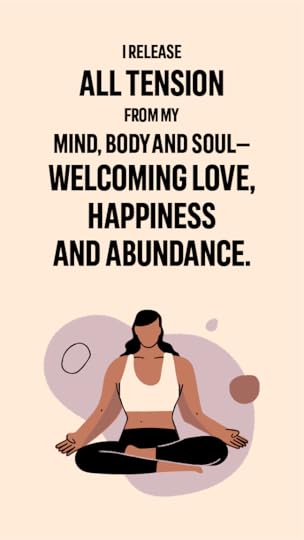 3. Get Out of Bed
3. Get Out of BedDirectly related to our last tip is getting out of bed. Your phone, tablet or another piece of technology that you start using upon waking up is only wasting your time.
Getting out of bed is the first step to any productive and mindful morning and day. Immediately getting out of bed upon waking up gets you moving and ready to get through the rest of your morning routine. Set yourself up for success right from the moment you wake up.
 4. Drink Water
4. Drink WaterStarting your day with a tall glass of water is much more healthy than an alternative such as coffee or tea.
Drinking at least 8 oz. of water will get your digestive system working for the day and give you a small boost of energy to help you wake up. Taking care of your body and its needs right when you wake up will not only improve your physical health but also your mood and overall mental health.
5. Keep a JournalKeeping a journal to log your morning routine can be great for holding yourself accountable and making sure you actually follow the routine you’ve set for yourself.
Working mindfulness into your daily routine can be difficult, it’s not often that one takes the time to reflect on how they are, what their goals for the day are, and how they’re going to achieve those goals.
We’ve included a mindfulness journal below for you to keep focused and track how you’re doing on a daily basis, with a focus on constructiveness rather than negativity.
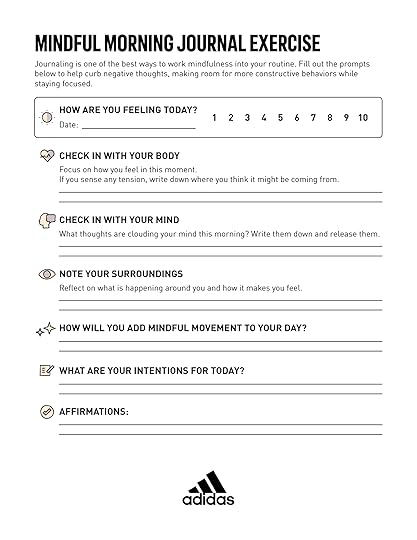 6. Get Some Exercise
6. Get Some ExerciseExercising in the morning will get your blood flowing and help you wake up and get ready for the day. It will also help regulate your sleep/wake cycle and can help you lose weight.
Slipping on a pair of men’s running shoes or women’s sneakers and going for a run or some other sort of exercise is one of the best ways to start your day off right.
If you’re not able or simply don’t have the time for a full exercise in the morning, consider another option such as yoga or stretching to get you started.
7. Remember to EatEating within the first hour of waking up and breaking your fast is ideal for stimulating your metabolism. Eating later in the day can have the opposite effect, slowing down your metabolism.
A faster metabolism will make your body burn more calories throughout the day and give you more energy. Eating before any morning workouts also provides important fuel for your body to power through your exercise and the rest of the day, even if it isn’t a large meal.
Incorporating mindfulness into your daily life can help relieve anxiety and stress and help you become more present in your everyday life. Follow the tips outlined in this article to build a mindful morning routine you can look forward to each day.



